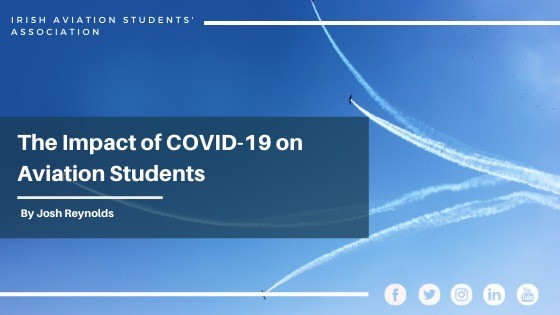176,000. That was the average amount of flights tracked per day by Flightradar24 in March 2019. 69,508. That was the amount of flights tracked by Flightradar24 on Saturday, the 28th of March 2020. The skies are emptying. COVID-19 is having a dramatic effect on the global aviation industry, the likes of which have not been seen before. The virus is suffocating airlines, with demand plummeting, borders being closed, and thousands of flights being cancelled. But how does this affect the likes of you and I as aviation students, or perhaps students with an interest in aviation?
One of the biggest changes for students has been the transition from traditional on-campus lectures to online lectures. Personally, this has been a very interesting experience. With university lectures suddenly out of their comfort zone and using online teaching aids such as Zoom, it has been both humorous and frustrating at times for sure! What has been interesting to observe is just how fast universities and lecturers were when adapting to the current situation and teaching students remotely. It’s necessary, but it’s not ideal. Students with important projects, assignments, labs, exams and other assessments are undoubtedly concerned about their current position, which is perfectly natural. I hope that your lecturers are able to sympathize with your current situation and make appropriate changes to your studies. We can only do our best and work with what we’ve got. For the time being at least, showing up to online lectures in your pyjamas is perfectly acceptable, and that will make for great stories in years to come.
Another big worry for aviation students and those pursuing a career in aviation is recruitment. COVID-19 has rocked the industry, and the affects of this will likely leave a lasting impact. IAG and Ryanair have frozen recruitment, as many airline companies are taking measures to reduce expenses so that they can weather this storm. I’m sure that many of us have seen pictures of aircraft grounded on taxiways, aprons, etc which is a horrible sight. Those with part-time jobs in aviation face their hours being cut or temporarily being laid off. Students seeking internships may see their offers postponed or cancelled. Graduate programmes and full-time jobs may be put on hold. Airline cadetships will most likely see delays before coming back online. This affects nearly every student in an aviation-related course. So how worried should we be? The uncertainty and unpredictable nature of the situation has everyone understandably nervous. No one knows exactly what will happen. Michael O’Leary recently said that Ryanair can, and will survive through a prolonged period of reduced or zero flights, and IAG Chief Executive Wille Walsh has delayed his retirement in order to lead the company through this crisis. Resilience and leadership are traits of leaders in aviation, and this is something we can learn from as students.
There are some silver linings in this dreary time for the industry. Aviation is doing its part as well in the fight against COVID-19. While passenger demand has fallen, demand for cargo operations has surged. The transport of vital medical equipment and supplies is crucial and cargo airlines who largely go unnoticed, are now in the spotlight and keeping supply chains open. Air ambulances and the Coastguard are still flying and saving lives. Also, Aer Lingus is operating flights with their A330 aircraft to Beijing for the first time ever to collect PPE equipment for the HSE.
As students, we can play our part too by staying at home.
Aviation is about connecting people. When things return to normality in hopefully the not too distant future, aviation will have a large role to play in connecting people again. In the meantime, let’s stay connected, remotely.
Stay safe. Stay connected. Stay focused.
